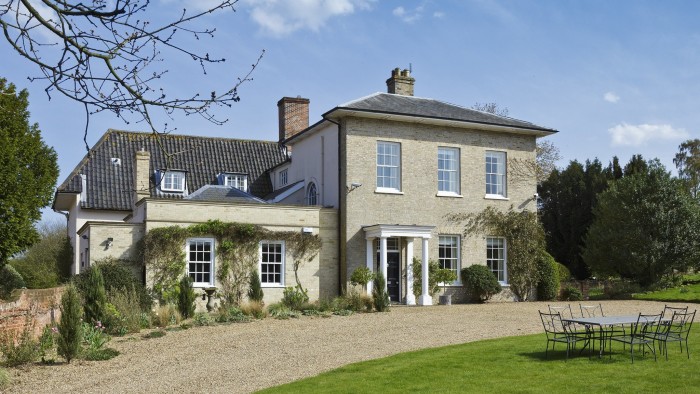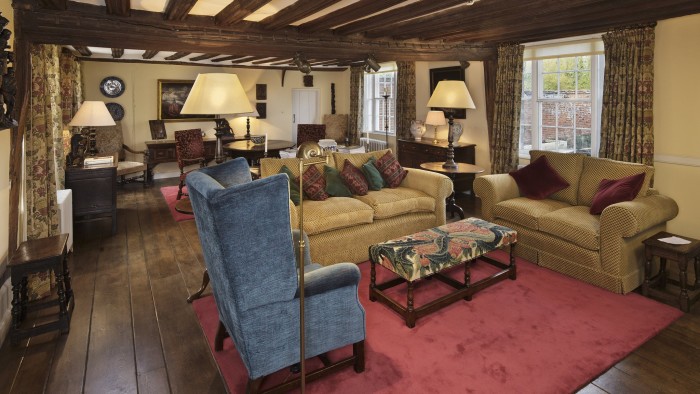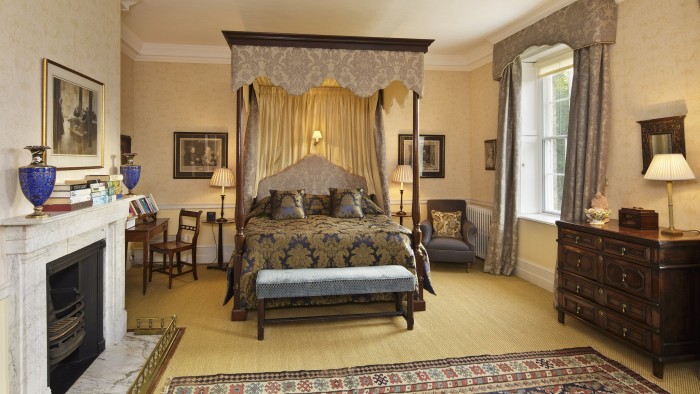How I simplified my life by selling (nearly) everything I own

Roula Khalaf, Editor of the FT, selects her favourite stories in this weekly newsletter.
You could call us the ultimate downsizers.
Until a few years ago, my wife Janet and I had three homes — in London, Suffolk and Tuscany. We spent years refurbishing them, furnishing them and (importantly) enjoying them. But as I inched further into my seventies, we felt an increasing desire to simplify.
First, we realised that we were no longer enjoying our Tuscan home as much as we had before. We were spending so much of each summer in Tuscany, we weren’t seeing anywhere else. As we didn’t wish to have a European home which we visited rarely — we knew too many people for whom this had become true — we decided to sell our home in Montalcino. Surprisingly, this proved painless. Overwhelmingly, we felt relief.
Which set us thinking. Did we really want homes in both London and Suffolk?
For most of my adult life, I have been accumulating assets. At the age of 30 I started Interbrand, the world’s first branding consultancy. We “invented” branding as a serious business discipline. We created many brand names that went on to become household names, including Hob-Nobs, Mondeo and Viagra among hundreds of others. At the age of 50, I sold up and “retired”.
With three friends, I then bought Plymouth Gin, producers of a spirit which 25 years ago, many considered to be in terminal decline. But we lit the fuse, I believe, on the current gin revolution. We sold it to Absolut Vodka.
Next, I bought an exquisite moated manor house in north-east Suffolk and built one of Britain’s first craft breweries, St Peter’s. Our Without® alcohol-free beers are particularly successful.
And, most recently, three friends and I started Ruffians, barbers and producers of male grooming products.

We spent half the week in our London home in Islington, and the other half at Holland House in Huntingfield. So which of our two homes might we sell? We loved them both. I inclined towards keeping Suffolk (just) and my wife towards London. However, the weekly commute was becoming onerous and a decision was needed.
Sadly, it’s too easy to put such a decision off until it’s too late. We lost a close friend at the end of last year, and have several other friends who are very sick indeed. This has caused us to think about our own mortality — although I stress, not in a morbid way. If either I or my wife suffered a serious illness or kicked the bucket, we would be too preoccupied with health issues to get our affairs in order. We don’t want to leave this for the surviving partner, or our executors, to sort out.
So we decided to simplify our lives deliberately in a controlled and focused way.
The prevailing view seemed to be that old folks like us (I am now 75, my wife 66) should retire to the country and leave urban living to younger people. The more we weighed the options, the less we supported this view. We agonised, but eventually chose to stay in London — for its youth, multi-cultural vibrancy, restaurants, theatres, public transport, and access to airports.
We also liked the fact that we wouldn’t need a car in London. A car is essential in Suffolk, yet who knows for how long we’ll be able to drive? Importantly at our age, in London we are only minutes away from great teaching hospitals, while in Suffolk, the nearest general hospital was an hour away.
Last autumn, the sale of Holland House was completed through Savills. It wasn’t easy as the market is tough and prices are depressed. But we got it done, and we are delighted. Our cars have been sold too. We are now embarking on a stripped down, simplified, London-based lifestyle.
The remaining issue was the disposal of the contents of our country house; in particular, our many antiques and objets d’art, collected over 30 years. These include early carved oak pieces, porcelain, pewter, art and furniture dating from the 16th to the current century.

Unfortunately, we can take very little of this back to London with us, as our London home is already fully furnished. And, as is often the case, our younger beneficiaries have very different tastes in home decor. So, we have chosen the auction route.
We have been advised not to expect high prices as the antiques market is also depressed. “Brown furniture” is suffering particularly acutely — in many instances, items make only 10 per cent of the level they would have sold for 10 years ago.
“Brown” mainly refers to late 18th and 19th century mahogany furniture, but the market for country oak is also depressed. We don’t have much conventional brown furniture, but even so, we know we’ll take a hammering. Even our cherished objets will make only a fraction of what we paid for them.
Indeed, the items we are selling probably cost us well over half a million pounds and we would do well to realise one-third of this. Ringo Starr’s old sneakers would have been a much better investment, though rather less decorative.
But we are philosophical. Fortunately, the auction process itself is proving to be efficient and painless. And, no, we’ll not be at the sale (if you are interested, Sworders auctioneers, Stansted Mountfitchet, Fine Interiors, March 12-13). We will keep our fingers and all else crossed.
We are also quite certain we have done the right thing. We loved our time in Suffolk and made wonderful friends, but all good things must come to an end. In any event, there will be room for them to come and stay. We have decided to buy a larger London home, across the road from our current house in Islington. After the renovations have been completed, we will move in.
On the business front, I’ve brought in two highly competent drinks trade executives as the chairman and chief executive of St Peter’s Brewery, and my wife and I have resigned from the board (we remain “sleeping investors”).
I have also scaled back my involvement at Ruffians, but I still remain chairman — it’s too much fun to walk away from, but run brilliantly on a day-to-day basis by Andy Cannon, my chief executive and partner.
Our decluttering is nearing completion and the overwhelming feeling is one of relief. We don’t want to spend our energies looking after multiple homes. But we are determined that this simplification is not a negative thing, nor a closing down of our lives. We see it instead as the beginning of a new and exciting phase — and have big plans to become more involved in London activities, and to travel more than ever.
John Murphy is the chairman of Ruffians and the author of “Brandfather: The Man Who Invented Branding”
Letter in response to this article:
How to thrive in a simplified environment / From Taylor Dibbert, Takoma Park, MD, US
Comments